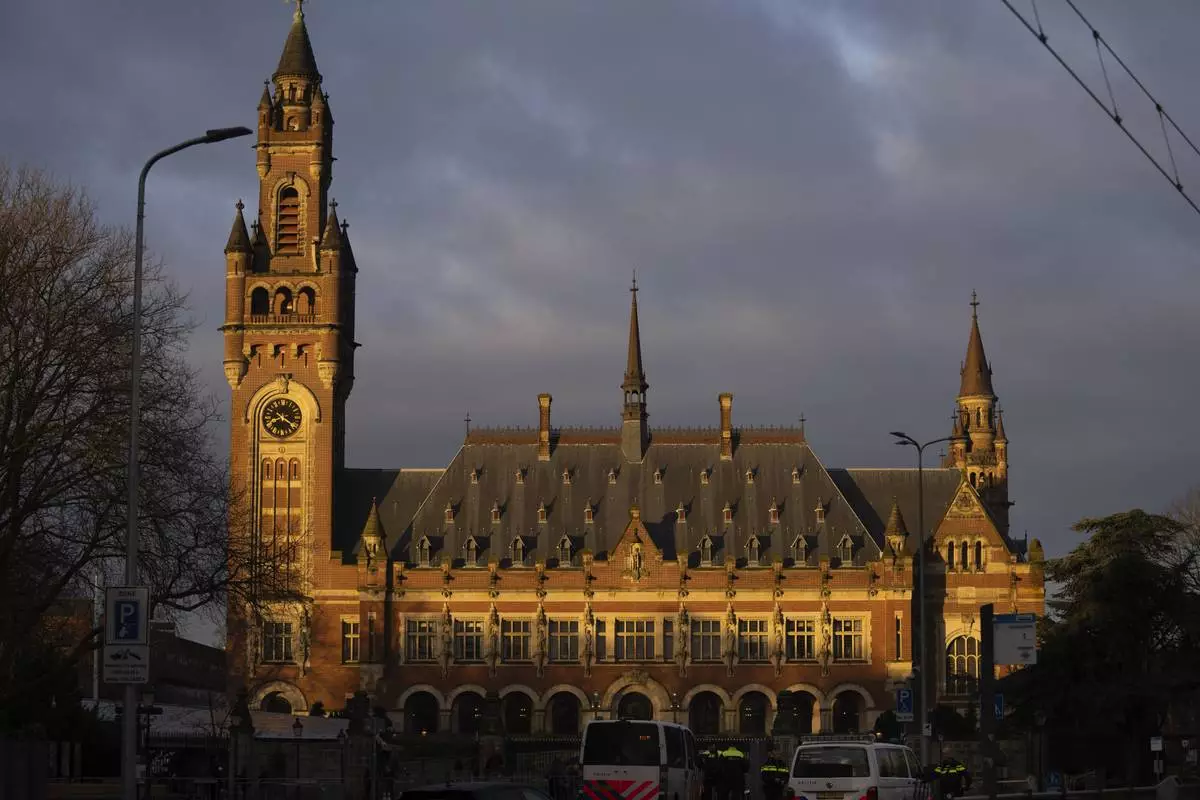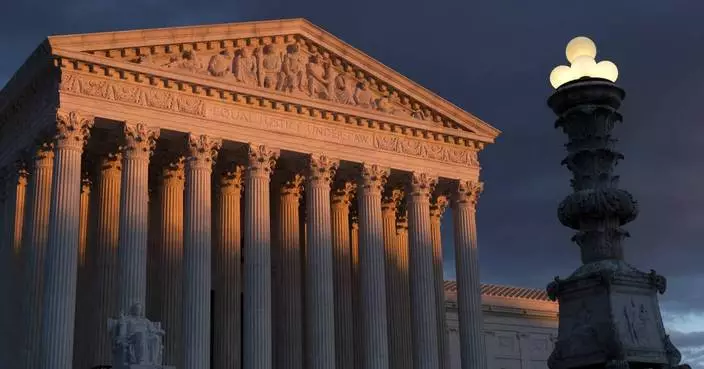Astronomers have discovered a super-size black hole harkening back to almost the dawn of creation.
It's the farthest black hole ever found.
A team led by the Carnegie Observatories' Eduardo Banados reported in the journal Nature on Wednesday that the black hole lies in a quasar dating to 690 million years of the Big Bang. That means the light from this quasar has been traveling our way for more than 13 billion years.

This illustration provided by the Carnegie Institution for Science shows the most-distant supermassive black hole ever discovered, which is part of a quasar from just 690 million years after the Big Bang. On Wednesday, Dec. 6, 2017, a team led by the Carnegie Observatories' Eduardo Banados reported the discovery in the journal Nature. (Robin Dienel/Carnegie Institution for Science via AP)
Banados said the quasar provides a unique baby picture of the universe, when it was just 5 percent of its current age.
It would be like seeing photos of a 50-year-old man when he was 2 1/2 years old, according to Banados.
"This discovery opens up an exciting new window to understand the early universe," he said in an email from Pasadena, California.
Quasars are incredibly bright objects deep in the cosmos, powered by black holes devouring everything around them. That makes them perfect candidates for unraveling the mysteries of the earliest cosmic times.
The black hole in this newest, most distant quasar is 800 million times the mass of our sun.
Much bigger black holes are out there, but none so far away — at least among those found so far. These larger black holes have had more time to grow in the hearts of galaxies since the Big Bang, compared with the young one just observed.
"The new quasar is itself one of the first galaxies, and yet it already harbors a behemoth black hole as massive as others in the present-day universe," co-author Xiaohui Fan of the University of Arizona's Steward Observatory said in a statement.
Around the time of this newest quasar, the universe was emerging from a so-called Dark Ages. Stars and galaxies were first appearing and their radiation ionizing the surrounding hydrogen gas to illuminate the cosmos.
Banados suspects there are more examples like this out there, between 20 and 100.
"The newfound quasar is so luminous and evolved that I would be surprised if this was the first quasar ever formed," Banados said. "The universe is enormous and searching for these very rare objects is like looking for the needle in the haystack."
Only one other quasar has been found in this ultra-distant category, despite extensive scanning. This newest quasar beats that previous record-holder by about 60 million years.
Still on the lookout, astronomers are uncertain how close they'll get to the actual beginning of time, 13.8 billion years ago.
Banados and his team used the Carnegie's Magellan telescopes in Chile, supported by observatories in Hawaii, the American Southwest and the French Alps.
THE HAGUE, Netherlands (AP) — Mexico accused Ecuador of a blatant violation of international law before the top U.N. court on Tuesday, asserting there was no legal defense for storming the Mexican Embassy in Quito to arrest a former vice president who had just been granted asylum by Mexico.
The April 5 raid, hours after Mexico granted asylum to former Vice President Jorge Glas, spiked tensions that had been brewing between the two countries since Glas, a convicted criminal and fugitive, took refuge at the embassy in December.
Leaders across Latin America condemned the raid as a violation of the Vienna Convention on Diplomatic Relations.
“There are lines in international law which should not be crossed. Regrettably, the Republic of Ecuador has crossed them," Alejandro Celorio Alcantara, legal adviser for Mexico’s Foreign Affairs Ministry, told the court. "The actions undertaken by Ecuador not only transverse the established boundaries of international law, but also have served a disconcerting precedent that reverberates across the international community.”
Mexico's chief of mission was shoved to the ground by police during the raid, an action captured on surveillance video that raised Mexico's ire.
“The forceful and violent incursion of Ecuadorian authorities into the premises of the Mexican Embassy and the unjustified exercise of violence against members of our diplomatic mission, alongside the blatant attempt to justify a grave violation of international law, vividly showcase Ecuador’s disregard for fundamental, universally accepted and long-standing norms,” Celorio said.
Ecuador said Glas was wanted because of corruption convictions and not for political reasons, and has argued that Mexico's granting of asylum to a convicted criminal was itself a violation of the Vienna Convention.
But Celorio asserted Tuesday that “There is no rule under international law that could nullify the inviolability of the embassy of Mexico and no standard under which the assault could be termed as a lawful operation.”
Two mornings of preliminary hearings at the International Court of Justice are focused on Mexico’s request for interim orders known as provisional measures to be put in force while the case progresses through the court — a process likely to take many months. Ecuador was expected to respond Wednesday.
Among the measures Mexico is seeking is for the court to order Ecuador to take “appropriate and immediate steps to provide full protection and security of diplomatic premises” and prevent any further intrusions. It also wants Ecuador to let Mexico clear its diplomatic premises and the homes of its diplomats in the country.
In its case filed April 11, Mexico also asked the court to award reparation and suspend Ecuador from the United Nations.
On Monday, Ecuador also filed a case at the International Court of Justice accusing Mexico of using its embassy to “shield Mr. Glas from enforcement by Ecuador of its criminal law” and arguing that the actions “constituted, among other things, a blatant misuse of the premises of a diplomatic mission.”
It asked the court to rule that Mexico's actions breached a number of international conventions. No date was immediately set for hearings in the case filed by Ecuador.
Follow AP’s coverage of Latin America and the Caribbean at https://apnews.com/hub/latin-america

A horse-drawn cart passes in front of the International Court of Justice in The Hague, Netherlands, Tuesday, April 30, 2024, where Mexico is taking Ecuador to the United Nations' top court accusing the nation of violating international law by storming into the Mexican embassy in Quito and arresting former Ecuador Vice President Jorge Glas, who had been holed up there seeking asylum in Mexico. (AP Photo/Peter Dejong)

Mexico's legal advisor Alejandro Celorio Alcantar, center, and agent and ambassador Carmen Moreno Toscano, right, gave a brief statement outside the International Court of Justice in The Hague, Netherlands, Tuesday, April 30, 2024, where Mexico took Ecuador to the United Nations' top court accusing the nation of violating international law by storming into the Mexican embassy in Quito and arresting former Ecuador Vice President Jorge Glas, who had been holed up there seeking asylum in Mexico. (AP Photo/Peter Dejong)

Judge Nawaf Salam, second right, presides over the International Court of Justice in The Hague, Netherlands, Tuesday, April 30, 2024, where Mexico is taking Ecuador to the United Nations' top court accusing the nation of violating international law by storming into the Mexican embassy in Quito and arresting former Ecuador Vice President Jorge Glas, who had been holed up there seeking asylum in Mexico. (AP Photo/Peter Dejong)

Ecuador's ambassador Andres Teran Parral, left, and agent Ana Maria Larrea, second left, wait for judges to enter the International Court of Justice in The Hague, Netherlands, Tuesday, April 30, 2024, where Mexico is taking Ecuador to the United Nations' top court accusing the nation of violating international law by storming into the Mexican embassy in Quito and arresting former Ecuador Vice President Jorge Glas, who had been holed up there seeking asylum in Mexico. (AP Photo/Peter Dejong)

Mexico's delegation walks towards the International Court of Justice in The Hague, Netherlands, Tuesday, April 30, 2024. Mexico is taking Ecuador to the top U.N. court Tuesday, accusing the nation of violating international law by storming the Mexican Embassy in Quito to arrest Jorge Glas, a former vice president who had just been granted asylum by Mexico. (AP Photo/Peter Dejong)

Tulips are flowering outside the International Court of Justice in The Hague, Netherlands, Tuesday, April 30, 2024, where Mexico is taking Ecuador to the United Nations' top court accusing the nation of violating international law by storming into the Mexican embassy in Quito and arresting former Ecuador Vice President Jorge Glas, who had been holed up there seeking asylum in Mexico. (AP Photo/Peter Dejong)

FILE - A view of the Peace Palace, housing the United Nations' top court, in The Hague, Netherlands, Monday, Feb. 19, 2024. Mexico is taking Ecuador to the United Nations' top court on Tuesday, April 30, 2024, accusing the nation of violating international law by storming into the Mexican embassy in Quito and arresting former Ecuador Vice President Jorge Glas, who had been holed up there seeking asylum in Mexico. (AP Photo/Peter Dejong, File)

FILE - A military vehicle transports former Ecuadorian Vice President Jorge Glas from the detention center where he was held after police broke into the Mexican Embassy to arrest him in Quito, Ecuador, Saturday, April 6, 2024. Mexico is taking Ecuador to the United Nations' top court on Tuesday, April 30, 2024, accusing the nation of violating international law by storming into the Mexican embassy in Quito and arresting former Ecuador Vice President Jorge Glas, who had been holed up there seeking asylum in Mexico. (AP Photo/Dolores Ochoa, File)

FILE - Police attempt to break into the Mexican embassy in Quito, Ecuador, Friday, April 5, 2024, following Mexico's granting of asylum to former Ecuadorian Vice President Jorge Glas, who had sought refuge there. Police later forcibly broke into the embassy through another entrance. Mexico is taking Ecuador to the United Nations' top court on Tuesday, April 30, 2024, accusing the nation of violating international law by storming into the Mexican embassy in Quito and arresting former Ecuador Vice President Jorge Glas, who had been holed up there seeking asylum in Mexico. (AP Photo/Dolores Ochoa)



















